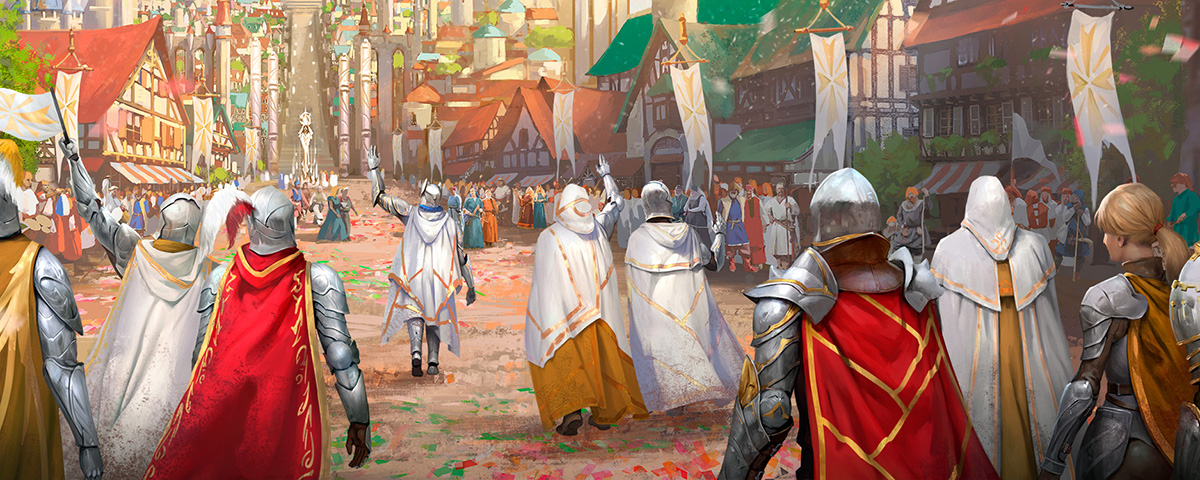
So You Want To Be a Judge: A Beginner’s Guide to Your First Event
October 21, 2023
For many players, Tier 2 events like ProQuests and Road to Nationals are their first step on the competitive ladder from competing at weekly armory events. Similarly, many Judges get their first taste of working at a tournament at these local events.
This article is a high-level primer about these events which I hope will be useful for anyone interested in working at one of these events coming up.

Get the Lay of the Land
Here’s a tip: keep an eye on the Retailer News Page for the event you’re interested in working at. Not only do the articles here contain relevant information about each event, but these articles are published earlier than the announcements on the main news page!
As a judge, these articles are invaluable as they typically provide details such as the contents (and distribution) of the prize kit, the start and end dates of the competitive season, the format and REL, and more!
Getting Involved
The first step towards judging your first Tier 2 event is being selected to judge!
The Tournament Organizer is the entity which is responsible for selecting judges (or in the exact words of the Tournament Rules and Policy (August 16, 2023 Update), “organizing appropriate staff for the tournament to ensure a smooth and efficient operation”). Every local community will have a different situation: perhaps you’re the only judge in the area and your LGS is looking for you to be the Head Judge, so being selected to judge your first event could be as simple as asking the store. Alternatively, your local community could already be well-supported with judges.
Being in a community which is already well-represented with judges can be a good thing! You have potential mentors and colleagues already set up for you to learn the ropes from. However, being selected to judge could be more challenging. In this case, you may have to do a little more work to get your foot in the door. A few suggestions:
- Let your community know that you’re interested in being a judge for upcoming Tier 2 events! The folks who have been selected to judge in the past may appreciate the opportunity to play for once. Let people know your goals so they can help you achieve them.
- Offer to be a support judge! Assisting the Head Judge of an event is a great way to observe how an event goes behind the scenes and learn the ropes from an experienced mentor.
- Grow your community! The more players that participate in OP in your area, the more likely it is that your local community will be supported with more Tier 2 events in the future.
Before committing yourself to judging an event, make sure to establish the compensation that you will be provided, and remember: the judge promos provided by LSS are a gift and not a replacement for compensation for your time and effort. These events should be a win-win-win for the judge team, the LGS, and the players. If you are looking for any additional guidance in this matter, please contact a resource like your local Judge Community Representative.
Survey the Battlefield
The better prepared you are in the days or weeks leading up to the event, the easier your day is. The last thing you want to do is show up on the day off and be completely surprised about an unexpected change!
One helpful tip is to communicate with the Tournament Organizer in advance to confirm the details and logistics of the tournament so there are no surprises. Some of these details include:
- What seating area and tables have been reserved for the players?
- Are table numbers available?
- Will there be a secure place available for the judge(s) to perform deck checks and keep decklists?
- Will there be a clock or timer visible for round timing?
- Where can paper pairings or standings be posted?
- (For draft events): Where will the product be and any token packs, etc. provided by LSS?
- What is the closing time for the store? What happens if our tournament is at risk of going over time?
- Who is distributing prizes? The store staff or the judge team? If it’s going to be the judge team, how will the team get the prizes? Do the store staff members that day know where the prizes are?
Another major question that should be resolved well in advance of the event is: who is the Scorekeeper? Is the judge team (or solo Head Judge) expected to perform the duties of the Scorekeeper, or will a staff member from your LGS be available to support you?
Suppose the judge team is expected to perform the role of Scorekeeper. In that case, there are even more questions that need to be asked and answered by the LGS:
- Will a laptop or tablet be provided, or is the Head Judge expected to bring their own or access the store computer?
- Will any other store staff require access to the provided device?
- How will the judge team confirm if registrants have paid for the event?
Ultimately, asking a few questions upfront could prevent major headaches down the line – and it’s much easier to solve any issues in advance when there aren’t dozens of players waiting!
The more experience you have, the easier it’ll be to quickly identify any potential issues. Don’t worry, it’ll get easier over time!
Preparing for the Day
Your non-technical preparation for the big day starts the night before: make sure you get a good night’s sleep! Even though it might be tempting to stay up all night playing Flesh and Blood with your local players on the eve of the tournament, you are guaranteed to have a long day from the start of the first round to the conclusion of the final!
Every seasoned judge has their own go-to packing list. As a starting point, here’s a preliminary list of things to pack or prepare:
- Tidy, clean and comfortable clothes and footwear. Being tidy and clean isn’t just a good idea: it’s required by the Judge Code of Conduct! Make sure that your clothes wiill work for a busy day of mostly being on your feet. Don’t be tempted to wear a brand-new pair of shoes on the big day either – make sure you break them in beforehand! Remember: you don’t need the official black-and-yellow judge shirts to be a judge for your Tier 2 event (typically provided to staff at Tier 3 events and above).
- Power for your devices. Depending on your venue, it could be a plug-in charger or it could be a battery bank. Don’t be in a position where you have to stress about your phone running low. Judges can be on their phones often throughout an event for numerous reasons, including keeping the time in the round, taking notes, looking through documents, or asking for help on Discord with difficult calls.
- Fuel for the day. If you’re a solo judge for an event, you likely won’t get the chance to leave the venue and grab a bite to eat. Make sure you bring all the food and drink you need to last for the day! The last thing you want is to be lacking in energy during the back half of your event.
- A way to take notes. Whether you use your phone or pen and paper to scribble things down, have a way to do so. You will have to juggle several small things throughout your event, from keeping track of time extensions to marking down different infractions throughout the day.
- Have your documents ready. Have critical documents like the latest Comprehensive Rules, Tournament Rules and Policy, and the Procedure and Penalty Guide ready to go in whatever format is easiest for you. Whether it’s saving PDFs on your phone, having bookmarks prepared, or even bringing a laptop or tablet with these documents easily accessible, you will be referring to these documents throughout the day – don’t lose them!
- Bring a box or some way to bring back your gifts for the event!

Starting the Day
Plan on arriving early! Get yourself settled in, then circulate around the room. One handy tip is to use this time to remind players that decklist submissions are required (and if players didn’t bring their own, to provide them with a pen and paper decklist), and to remind them about the fact that deck checks will be done. Remind players to remove any extraneous cards from their deckboxes and to check the condition of their cards to ensure that none are marked.
If you have the capacity to do so, you could offer to perform courtesy deck checks for players prior to the tournament. This courtesy check will give players peace of mind that there are no marked cards in their deck at the time. Be familiar with the policy regarding issuing proxy cards for marked cards.
Getting Things Started (Seating and Announcements)
Kicking the event off is another thing that is personal to every judge and TO, and as you gain experience as a judge, you’ll develop your own template. Here’s one suggested way to do things that should check all the major boxes:
- Pair Round 1 in GEM for Player’s Meeting
- Pairing the first round for a player’s meeting allows everyone to get seated and identification of any players who are present but not in GEM, or vice versa.
- There is the option (Step 6 below) to delete this round and re-pair for the start of the tournament. This is especially relevant if issues are identified with players not present or late additions to the tournament. However, make it clear to players that their ‘real’ opponent in Round 1 could still be the person they are paired with in the Player’s Meeting.
- (Optional) TO Announcement
- If a representative from the TO would like to speak at this time, this is a good time for it.
- Judge Announcement (1 minute or less)
- Welcome!
- Introduction of Judge Team
- Introduce the tournament (number of swiss rounds, top cut, format of the tournament, time of each round)
- State the REL of the tournament (Casual, Competitive, Professional)
- Remind players about Tardiness penalties (if applicable at the REL)
- State that decklists are required and that deck checks will be performed
- Remind players that judge calls are encouraged and that time extensions will be granted for such calls.
- Any questions?
- Collect Decklists
- Ask players to fold their decklists in half and raise their hands, then collect all decklists.
- (Optional) – Delete and Re-Pair Round 1
Your Duties in the Event
During the tournament, you will have a variety of tasks, and each task would be worthy of its own article! Three major tasks which most of your duties will fall under are:
- Starting and Ending of Rounds
- Deck Checks
- Taking Judge Calls
Let’s talk about each one at a high level.
Starting and Ending of Rounds
It is the responsibility of the judge team to maintain the round timer and keep the tournament moving at a reasonable pace. If there is a large digital countdown timer available, great! If not, ensure that players have some way of knowing how much time is left in the round, be it writing the end time on a whiteboard and having an analog clock visible, or (at a last resort) committing to providing verbal warnings at regular intervals.
Having a clear round-timer allows players to plan their breaks and their day. Set the expectation that if players want to leave the venue for a break, they must be present when the current round timer hits 0:00 – if all games are wrapped up by then, great! You can start the next round promptly.
If there are one or more games still going on as the timer nears 0:00, and none of those games have a time extension, then remind players of the end-of-match procedure when time is called. For any matches with an active time extension, remind them of that specific extension and be prepared to keep track of the match-specific end-of-round timing.
Deck Checks
Deck checks are a vital tool for ensuring the integrity of a tournament. As of the time of writing this article, the latest Tournament Rules and Policy document states that deck checks are “recommended” at Competitive REL – but if there is any way you can perform these checks, this would give you important experience as a judge and also advance your community’s experience with playing at more advanced RELs and being comfortable with the process.
The topic of how to perform a deck check efficiently could take up an entire series of articles. As a quick primer: typically, a deck check is done at the time when both players have presented their decks. At this time, the judge comes to the table and collects the presented cards as well as any associated deck boxes.
The judge performing the deck check could verify:
- Did both players present a legal deck (i.e. 60 cards minimum in Classic Constructed, 30 cards minimum in Draft)?
- Are there extra cards in the deck box (i.e. 85 cards are discovered between the presented deck and within the deck box for a Classic Constructed deck, which exceeds the maximum pool size of 80)?
- Are there any marked cards present?
- Do each player’s pool of cards match the submitted decklists?
At a large event like a Calling or higher, the dedicated deck check team will typically perform a thorough check of one or more tables every round. If you are a solo judge for your local ProQuest or Road to Nationals event, your resources could be stretched thin. Make your best decision about how thorough you can realistically be while balancing your other duties at the start of the round.
As a rule of thumb, I recommend that deck checks during swiss rounds take no longer than 10 minutes for a typical check of two decks. You should be able to cover items 1) through 3) above within that, with time to spare to check key cards against the decklist. During untimed rounds, more thorough checks which also include item 4) are possible with fewer games happening at once.
After performing your check, return the decks to the players, remind them to shuffle thoroughly, and give them a time extension equal to the time spent. If any infractions are discovered, perform the required investigation and address each infraction in accordance with the Policy and Procedure Guide.
A few final tips – don’t blatantly tell players what you’re checking for, your selection criteria for tables being checked, and what you’re not checking for during swiss or elimination rounds (i.e. if you only have the resources to check for marked cards, card pool size, and presented deck size) – even if this is the case, a bad actor could overhear this and plan accordingly. A little bit of mystery will keep everyone on their toes!
Taking Judge Calls
The topic of taking calls is worthy of another series of articles altogether, and far beyond the scope of this article to dive into details! Here are a few tips:
- When you arrive at the table, thank the players for calling you and explain that you will provide a time extension for the duration of the call. Note the time in the round for your recordkeeping purposes.
- Determine if you are being asked a theoretical question about the rules of the game, or if there has been an infraction. If a player wishes to step away from the table to discuss a theoretical rules question (e.g. involving cards in a hidden zone), allow them to do so.
- When asked a rules question, answer the question asked as clearly and directly as possible while not offering alternative lines of play or otherwise providing strategic assistance.
- If you are stumped, don’t hesitate to take a step back to refer to documents or consult with your fellow judges online.
If the nature of your call involves an infraction (i.e. Missed Trigger, Game Rules Violation), then the flowchart can become very complicated, very quickly! Some very general suggestions:
- Ensure that the current game state (including life totals, the status of the Stack and Combat Chain, etc.) is understood and agreed to between both players and yourself. If there is a discrepancy, investigate why and at what point this discrepancy arose.
- Determine the type of infraction and know the pathway to resolution as laid out in the Procedure and Penalty Guide.
- Perform the fix as instructed in the Procedure and Penalty Guide.
- Determine the level of Penalty to be assessed for the infraction. If a downgrade or upgrade is possible, investigate as required.
- When the path forward is clear, announce to the players that you have made your decision. Explain the situation, the infraction, the fix, and the penalty. Ask players if they understand the entire ruling before starting the fix.
- After everything is all said and done, give the players a time extension and make sure to record the penalties somewhere for tracking.
In between calls, make sure you’re visible and present at the event. Answering a quick rules question is so much easier than fixing an incorrect game state down the road, and the more accessible you are, the more likely it is you’ll be called on!
Closing Thoughts
Whew! That’s a lot of tips, and we barely scratched the surface of being a judge. If there’s one overarching theme that I like to remind myself of the Three Pillars of the Judge Code: Integrity, Communication, and Empathy. No matter what tasks we have to complete at any tournament, from your local ProQuest or Road to Nationals to the World Championship, with these principles in mind, you will surely be successful.
One of the best ways to learn after an event is to write your thoughts down and share them with the community, be it with a select group of trusted individuals, your mentor, or in a public space like the JudgeHub forum or Discord if you are comfortable in doing so. Keep an eye on these places during competitive seasons to experience different events around the world from the perspective of judges just like you.
Good luck out there! If you have any tips to share for new or experienced judges, please share them in the comments!
Felix Chung is a L2 Judge based in Calgary, AB, Canada. He is especially passionate about elevating and growing local communities. If you would like to hear more from him, he’s always available on Discord, or you can listen to him weekly on the IP2 Podcast. The opinions and views expressed in this article are his own and are not necessarily those of the Flesh & Blood Judge Program or Legend Story Studios.

